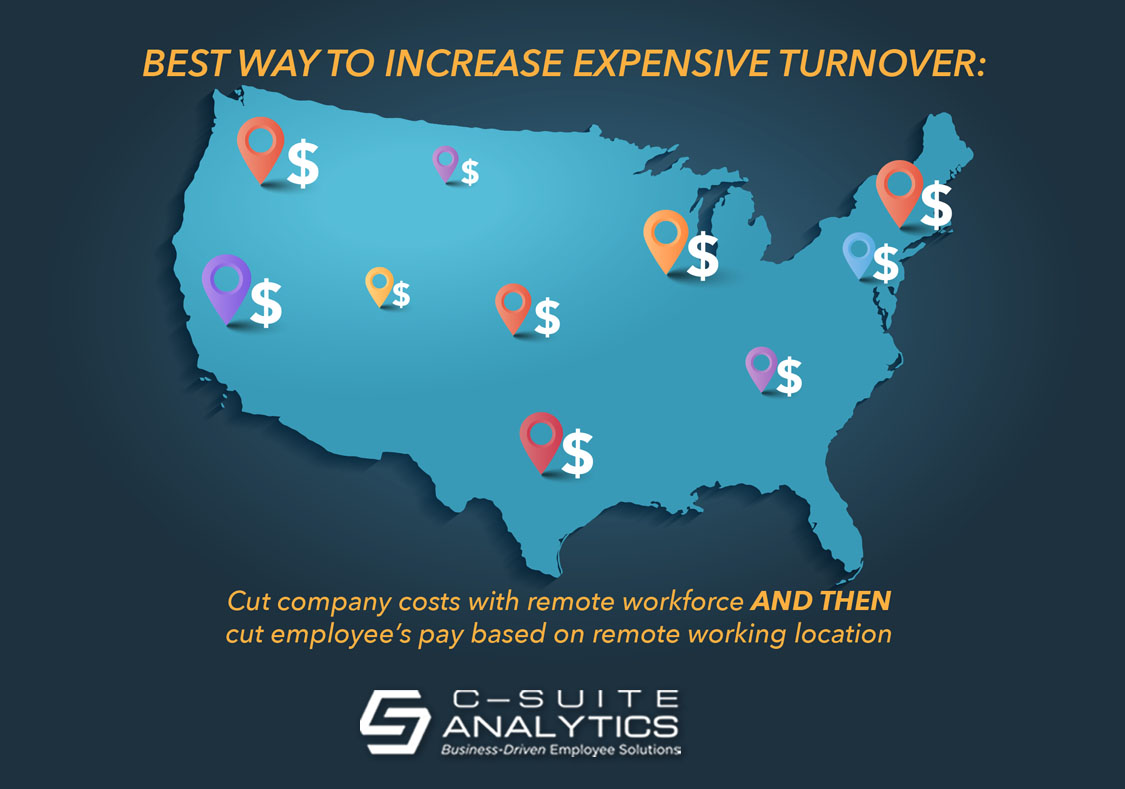Most hiring tools answer whether candidates can and will do the job, but not if they’ll stay. Learn how realistic job previews and motivational-fit interviews can improve retention from day one.
Want to Increase Expensive Turnover? Try This

As you read below, consider that the CEOs of these companies and their decision-making c-suite members have together built extremely profitable giants of companies by making smart decisions over several decades. One has to wonder if they have suddenly fallen and hit their collective heads on the curb. What are they thinking???
Google has announced they will reduce pay for those employees who have chosen to work permanently from home if their remote location has “lower labor costs than where their former offices are located”. [i]
In other words, Google will permit me to continue working for them remotely if I take a pay cut. A company spokesperson said, “Our compensation packages have always been determined by location, and we always pay at the top of the local market based on where an employee works from”.
As just one example, a Google employee who worked in New York City but now works virtually from Stamford, CT, can avoid the 60-minute train ride but must accept a 15% hit to pay. Facebook and Twitter are among others making similar pay cuts for virtual employees.
Where to start? Doesn’t it cost companies less when employees work from home with regards to real estate costs, office furniture, subsidizing the cafeteria, subsidizing parking, and more? This is CEOs saying to accounting, “The good news is our virtual employees are now going to cost less. And the even better news is we’ve cut their pay”.
And it’s not like these companies need the money.
So What If They Quit? Part One
Should you wonder what it costs to lose a software engineer, this story comes to mind. We worked with an aerospace company where the CFO said he had never considered turnover a cost, that it wasn’t part of his tracking nor his academic training. I offered that once we completed our cost study that he might find turnover to be his second- or third-highest cost after salaries and production supplies. He ultimately agreed to a cost for losing one software engineer to be $121,450…and called me the next day to say he had just determined employee turnover to be his company’s second-highest cost. This was a great learning moment for that CFO.
So how many turnover dollars are Google and other companies gambling with by implementing their new “work virtually for less” policies?
Our Comprehensive Turnover Solution is designed to get results for companies like yours by cutting turnover 30% and more. Write me or connect with me if you want to learn more…DFinnegan@C-SuiteAnalytics.com.
So What If They Quit? Part Two
Last week I reported on several key facts about the difficulty finding talent, one of which was the following:
Through June the U.S. is on track for 30% of its workforce voluntarily quitting their jobs this year, smashing all previous marks.
Also included were there are more job openings than any time in history. Might you think those lesser-paid technology workers might be snooping on Indeed and other sites on their company-paid computers?
Here’s an idea for Google, and all other companies that are slashing pay because employees are working for home, no matter the reason:
Grandfather them in.
Implement your take-away pay policies going forward but not now. Employees have been whipsawed by come to work/stay home messages for going on two years now. We’ve been sitting at our dining room tables with our kids, working longer hours than ever, trying to make sense of both work and our worlds, and you want to tell us this?
It’s never, ever good to take things away from high-performing employees, especially money. So as these companies invite their virtual employees to leave, consider the short-term impact on production schedules and product introductions that could cost millions of dollars. But the longer, more permanent impact is all employees lose trust. That’s the bigger cost.
[i] https://www.shrm.org/resourcesandtools/hr-topics/compensation/pages/google-renews-location-based-pay-debate.aspx



